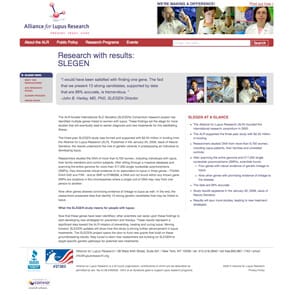 Research with results: SLEGEN 2008
Research with results: SLEGEN 2008
The ALR-funded International SLE Genetics (SLEGEN) Consortium research project has identified multiple genes linked to women with lupus. These findings set the stage for more studies that will eventually lead to earlier diagnosis and new treatments for this debilitating illness.
The three-year SLEGEN study was formed and supported with $2.25 million in funding from the Alliance for Lupus Research (ALR). Published in the January 20, 2008, issue of Nature Genetics, SLEGEN’s initial results underscore the role of genetic variants in an individual’s predisposition for developing lupus.
Researchers studied the DNA of more than 6,700 women, including individuals with lupus, their family members and control subjects. After sifting through a massive database and scanning the entire genome for more than 317,000 single nucleotide polymorphisms (SNPs), they discovered robust evidence of an association to lupus in three genes – ITGAM, KIAA1542 and PXK – and at SNP rs10798269, a DNA unit not found within any known gene. SNPs are locations in the chromosomes where a single unit of DNA may vary from one person to another.
What the SLEGEN study means for people with lupus:
Now that these genes have been identified, other scientists can seize upon these findings to start developing new strategies for prevention and therapy. These results represent a significant step toward the ALR mission of preventing, treating and curing lupus.


